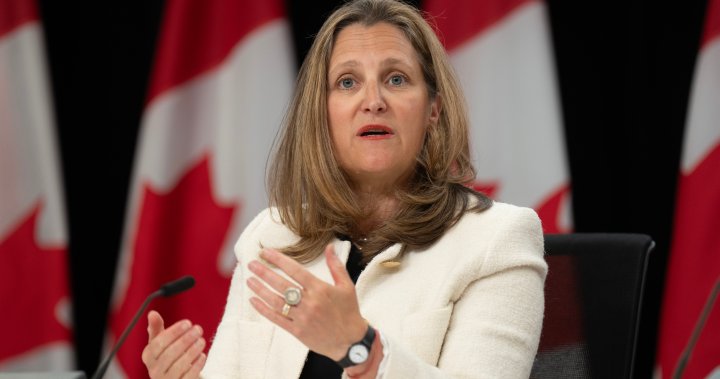Finance Minister Chrystia Freeland and International Trade Minister Mary Ng are set to announce a plan for potential tariffs to protect Canada’s electric vehicle supply chain from unfair Chinese competition. This comes after the United States and Europe implemented higher import tariffs on Chinese-made EVs. Before Canada can impose new tariffs, an anti-subsidy investigation by the Canadian International Trade Tribunal must be completed. Currently, the only Chinese-made EVs imported into Canada are Teslas from the Shanghai factory, but China is a key player in providing batteries and components for EVs globally.
Accusations of unfair subsidies in China’s EV industry have led to retaliatory measures from both the U.S. and Europe. President Joe Biden announced a tariff increase on Chinese EVs from 25 per cent to 100 per cent this year, along with higher tariffs on lithium-ion batteries and other clean energy products. The European Commission is also in the process of completing its investigation and has announced provisional tariffs on Chinese-made EVs between 17 per cent and 38 per cent starting July 4, pending negotiations between Europe and China.
The decision on tariffs in Canada will be determined after a consultation process. Prime Minister Justin Trudeau has expressed close monitoring of the situation and deliberation on the appropriate action for Canada. Minister Ng confirmed that Canada is actively working on a plan in response to the developments in the U.S. and Europe, while engaging with the Canadian industry. The anti-subsidy investigation process typically begins with a complaint from the industry, and Canada has heavily invested in the electric vehicle supply chain with over $46 billion in investments and joint promises of up to $53 billion in incentives.
The issue of unfair competition in the EV market is a global concern, with China dominating the production of lithium-ion batteries and a significant share of global EV sales being Chinese-made. The prevalence of Chinese-branded EVs in Europe has increased from one per cent in 2019 to eight per cent, raising concerns of unfair subsidization and market manipulation. The consultation period in Canada before imposing precise tariffs allows for input from industry stakeholders and a thorough assessment of the potential impact on the domestic electric vehicle sector.
The ongoing negotiations between Europe and China suggest a willingness to address the issue of unfair subsidies and reach a mutually beneficial agreement. Canada’s decision on tariffs will be influenced by the outcomes of these discussions and the results of the anti-subsidy investigation. As the government works on developing a plan to protect Canada’s electric vehicle industry, the focus remains on ensuring a level playing field and supporting the growth of domestic manufacturing projects. The investments made in the electric vehicle supply chain demonstrate a commitment to fostering innovation and sustainability in the industry, while addressing challenges posed by international trade dynamics.













